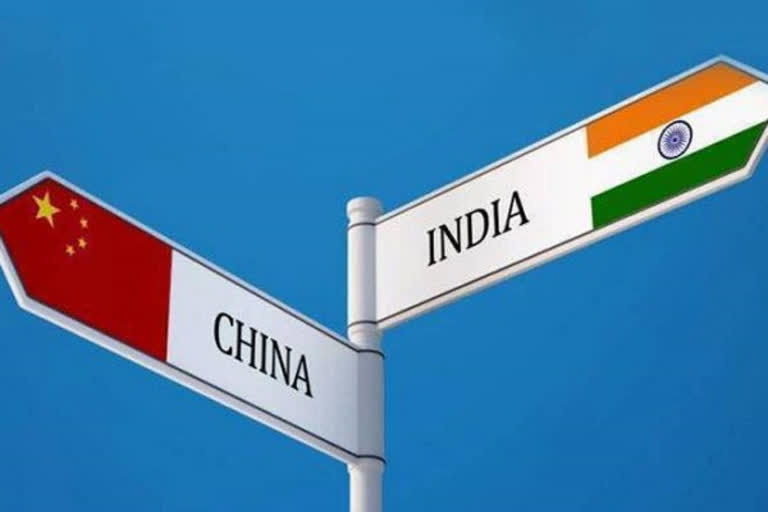New Delhi: India didn’t join other members of the Shanghai Cooperation Organization in backing China’s Belt and Road Initiative (BRI), which New Delhi has consistently opposed, as the main reason being a key part of it passes through PoK.
Now the questions that arise out of it is why did India refuse to join or what are the pros and cons of India not joining the project?
Experts opine that the BRI is hollowing countries out. Already, its “iron brother” Pakistan is reeling under Chinese debt. Other countries such as Sri Lanka and Mongolia are being weighed down by Chinese debt etc.
In an interview with ETV Bharat, Observer Research Foundation (ORF) Vice President, Gautam Chikermane sad, “BRI passes through Indian territory currently occupied by Pakistan. This is the China-Pakistan Economic Corridor and is a direct violation of and attack on India’s sovereignty”.
He says, by persistently attempting to grab more strategic territory, first at Doklam in Bhutan and now at Ladakh, the Chinese Communist Party under Xi Jinping is proving itself to be an enemy of India, it is itching for a fight. It is proving that the rise of China will not be peaceful. Of course, it will not succeed but has made its intention clear. Thus, for India to be part of any high-stakes and strategic initiative that is led by China is impossible.
Furthermore, Chikermane noted that the BRI is hollowing countries out. Already, its “iron brother” Pakistan is reeling under Chinese debt. Other countries such as Sri Lanka and Mongolia are being weighed down by Chinese debt. “In Africa, Djibouti is in Chinese debt. In Europe, one-fifth of Montenegro’s debt is on account of Chinese BRI. Gradually, countries now understand the strategic risk of joining OBOR. India understood this early and has set the international narrative around it, which other countries are now gradually embracing”, he added.
Chikermane’s comment comes after all member states, barring India backed the China-led “One Belt, One Road initiative in a joint communiqué issued at the end of the SCO Council of heads of government meeting hosted by India on Monday.
The communiqué said the Republic of Kazakhstan, the Kyrgyz Republic, the Islamic Republic of Pakistan, the Russian Federation, the Republic of Tajikistan and the Republic of Uzbekistan, reaffirming their support for China’s "One Belt, One Road” (OBOR) Initiative (BRI), note the ongoing work on joint implementation of this project, including efforts to bridge construction between the Eurasian Economic Union and OBOR”.
Also read: Algeria president to leave Germany after Covid treatment
Srikanth Kondapalli Professor in Chinese Studies, JNU said, “India has been objecting to the BRI since 2014 as it violates the sovereignty of India in Kashmir. India stated about this at Qingdao meeting of SCO last year and so this year's objection is not new. So we can say India has been consistent on the issue. SCO decisions are taken by consensus and another feature of the SCO is their conservative attitude towards sovereignty issues. So by flagging the sovereignty issue, India is touching upon the core aspect of the SCO. This may not affect the SCO in the short term, but in the long term the organization’s credibility will be lost if one dominant member violates the sovereignty of the other”.
He mentioned that MEA's objections to BRI includes-violation of sovereignty in Kashmir; lack of transparency in contracts; no sound financing options (leading to debt trap); environmental degradation.
Professor Kondapalli further pointed out that there is a Centre for Strategic and International Studies (CSIS) that shows 93 per cent of BRI projects are taken away by Chinese state-owned enterprises (no space for other companies). “India is the 2nd largest contributor to the Asian Infrastructure Investment Bank (AIIB) which partly finances the BRI”, he added.
“Led by India in the East and the US in the West, there is a global decoupling from China underway. This decoupling will take up to 24 months and new supply chains will be created during this time. As a result, India can't join OBOR.
The message from India and the world to China is: this much and no more — reform or stay isolated with like-minded failed states like North Korea and Pakistan”, stated Gautam Chikermane.
The council of heads of government is SCO’s second-highest body and is responsible for handling the trade and economic agenda. This was the first time India hosted a meeting of the body since it was admitted into the eight-member grouping in 2017.
India has repeatedly said it will not join BRI because it does not offer a level playing ground to the country’s businesses. It has also opposed BRI because a key component – the China-Pakistan Economic Corridor (CPEC) – passes through PoK.
Moreover, New Delhi’s trade concerns related to Beijing were a key factor behind India’s decision not to join the Regional Comprehensive Economic Partnership (RCEP), the trade deal recently signed by the 10 members of the Association of Southeast Asian Nations (ASEAN) and Australia, China, Japan, South Korea and New Zealand.



